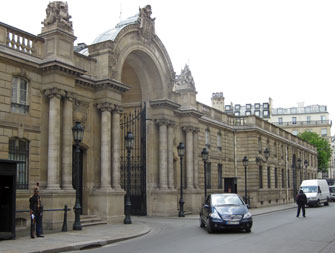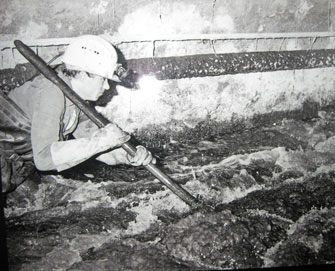
I am no fan of Nicolas Sarkozy’s politics, in particular his shameless pandering to the anti-immigration far-right National Front. As an immigrant to France myself, I kind of, sort of, pretty much tend to come in on the “pro” side of that particular issue.
However, now that he is officially on his way out of office, and effectively already out (unlike in the United States, the “lame duck” — or foie gras lamé — period is only 10 days), I thought I would try to find something nice to say about him.
This means two things:
1) It’s going to be a short column. And…
2) You’ll have to excuse me for a moment while I check to make sure that I have everything I need to proceed.
Hip waders? Check.
Rubber gloves? Check.
Hazmat helmet? Check.
Ten-foot pole? Check.

Uh-oh – forgot my gas mask. Never mind, here goes:
Despite spending his five years as president pursuing questionable policies mostly intended to make him look good on paper rather than actually improving his constituents’ lives, and despite having a protean political position that made it clear that his primary interest was not the power, prestige and welfare of France, but the power, prestige and welfare of Nicolas Sarkozy, our former president did oversee one very positive development.
When he took over as Minister of the Interior under then-President Jacques Chirac (a.k.a. Jack Shoerack) in 2002, France perennially had about 8,000 road deaths per year. Then Sarkozy, or more likely someone under him but low-ranking enough that Sarkozy could take credit for it, came up with a radical idea.
It was a groundbreaking, revolutionary proposal, nearly shocking in its bold, hors-la-boîte thinking. And that proposal was: to enforce the traffic laws.
I’m not kidding. Apparently no one had ever thought of this before. The tolerance for speeding in France at the time was 20 percent. Yes, two-oh – a two followed by a zero. In other words, the gendarmes (a.k.a. la hauteroute patrouille) wouldn’t give you a ticket on the freeway unless you were going at least 156 kilometers – that’s 97 miles – per hour.
So in about 2003, the Sarkozy ministry sent out the word that the tolerance would henceforth be cut down to 5 percent. Then when he was elected president in 2007, Sarkozy broke with a long-standing executive practice of declaring a blanket pardon for outstanding traffic (including speeding) tickets as a reward to the populace (or rather the reckless, hot-headed, needlessly aggressive portion of the populace) for electing him.
Chirac had already limited the amnesty to parking tickets in 2002, but before that the presidential pardon had been such an entrenched tradition in France that people would commonly let their tickets go unpaid until they owed thousands of euros in fines and late fees, confident that the chief exec-elect would wipe the slate clean. Obviously, this tended to encourage drivers to exceed even the unofficial inflated speed limits.
There were a couple of other intelligent traffic law reforms under Sarkozy as well, including lowering the blood alcohol limit, banning the use of cell phones at the wheel and handing out the first tailgating tickets in the history of the republic.
All of this had the effect of reducing the road fatality rate to 5,000 per year. Not bad. And then a couple of years ago, the highway authority started installing automatic speed cameras all over the country to crack down even harder on the hot of head and heavy of foot.
Last week it was announced that, largely as a result of the cameras, the death rate on the nation’s highways had dipped again this year, by a thoroughly respectable 20 percent. So as Sarkozy moves out of both the political limelight and the Elysées Palace, he can look back with pride and satisfaction on at least one truly impressive accomplishment from his time in office: marrying Carla Bruni.
Oops, I mean two truly impressive accomplishments from his time in office: marrying Carla Bruni and literally halving the highway death toll, saving 4,000 lives per year by the end of his term. All told, I would estimate that the road safety measures implemented on his watch have spared about 25,000 men, women and children from violent premature death.
That’s 25,000 more French people in existence today, living and breathing, going places, doing things, pursuing careers, raising families, enjoying life and voting for Hollande.
And also carping, grousing and griping every single day that they can’t drive home from the bar really fast without getting a dieudamn ticket, like in the good old days.
Author’s afterthought: David Jaggard says, “Speaking of former presidents and ill-conceived policies, George W. Bush has been out of office in the United States for more than three years now, and I’m still trying to think of something nice to say about him. Not very hard, though.”
Reader Barney Kirchhoff writes: “Marrying Carla? Well, OK.
“Will Hollande take the hint? Who cares.”
“Cutting road deaths? Fine.”
“Now, spend a little time on curbing bicyclists who ride through red lights, ride at night with no headlights, ignore one-way restrictions, ride on sidewalks, etc.
“I’m in favor of bicycles but I do think bicyclists should show a little more respect for pedestrians.
“The 16th arrondissement has made a small start on enforcement but it will take a lot more 90-euro fines to make bike riders realize that traffic laws apply to them also.”
David Jaggard replies: “I have a cold, hard, spiny place in my heart for scofflaw cyclists (and scooterists) as well, but that’s more of a municipal rather than national problem. When the Vélib bike-share bikes were introduced, the city of Paris solemnly proclaimed that cyclists would be strictly held to the traffic code but, obviously, it never happened. I touched on this topic in this article from 2010.”
Favorite
An album of David Jaggard’s comic compositions is now available for streaming on Spotify and Apple Music, for purchase (whole or track by track) on iTunes and Amazon, and on every other music downloading service in the known universe, under the title “Totally Unrelated.”
Note to readers: David Jaggard’s e-book Quorum of One: Satire 1998-2011 is available from Amazon as well as iTunes, iBookstore, Nook, Reader Store, Kobo, Copia and many other distributors.
